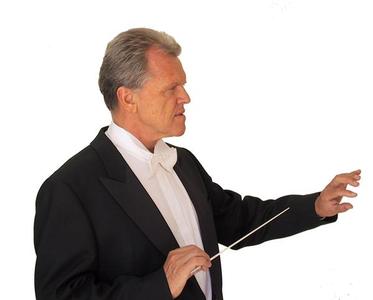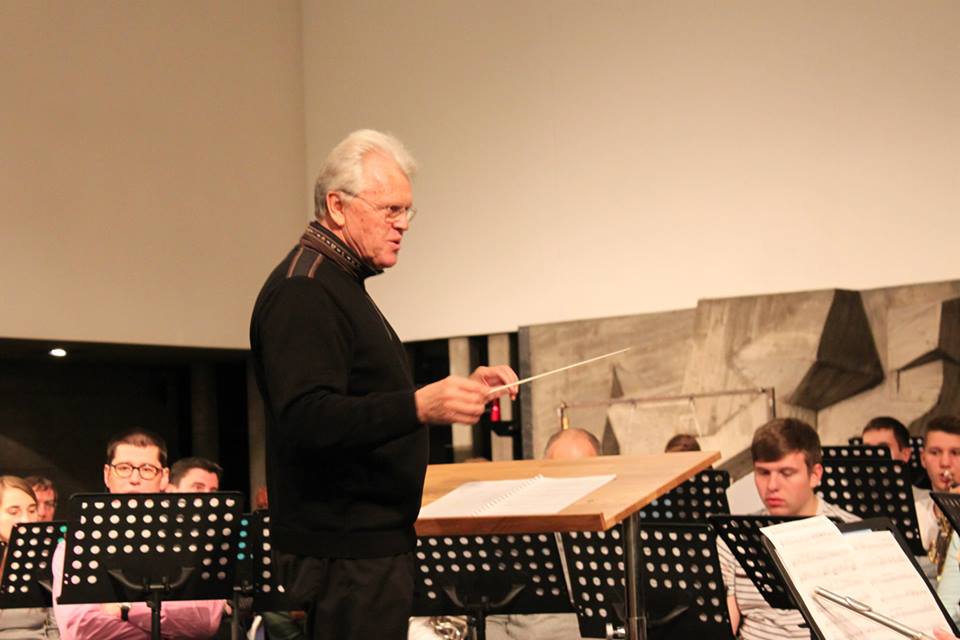OBITUARY
FRANZ PETER CIBULKA 1946 – 2016
COMPOSER, CONDUCTOR, PERFORMER, JUROR AND LECTURER
Tim Reynish July 2016

The death is announced of the Austrian composer Franz Peter Cibulka. Born in 1946, he completed his musical studies in clarinet, composition and orchestral conducting at the University for Music and Performing Arts in Graz, Austria. He served as Professor of Clarinet, Chamber Music and Music Theory at the Johann Joseph Fux Conservatory in Graz until July 2002 when he began working exclusively as a free-lance composer. His list of works includes more than 500 compositions of the most diverse instrumentation and styles resulting from his artistic collaboration with various performers.
Cibulka mainly arranged compositions on demand, respecting the artists' wishes and ideas. However, he also wrote music that reflects his own creativity and visions. This can be thoroughly felt in pieces such as AQUARIUS, scored for wind orchestra, two speakers and electronic tape, in which he transformed his despair about humans' misuse of nature into an exceptional musical work. As might be expected in such a great range of music, Cibulka writes in many diverse styles, using traditional approaches to melody and harmony alongside jazz and popular elements, electronics and avant garde experiments.
Franz Cibulka achieved an international reputation following the performance in 1997 of several of his works at the World Association for Symphonic Bands and Ensembles (WASBE) held in Schladming, Austria. Since that time he has been invited to Australia, America, Russia and many European countries as a composer, conductor, performer and lecturer.
You will find a huge amount of information on his website: http://www.artofcibulka.com/
Many of the works mentioned in my text below can be found by browsing through this site, and details are given of scoring, level of difficulty (A is easy, E the most difficult). If you are searching for ensemble works, brass group, clarinet choir etc, you will certainly find useful works here by Cibulka.
I have browsed through my notes on his music to try to give something of a picture of a composer who has contributed enormously to the medium of music for wind, brass and percussion, but who is relatively unknown outside Europe. His trombone repertoire seems to be particularly well known, and some is published by Warwick Music,
CIBULKA AT WASBE
Franz Cibulkafirst came to my notice in 1981, at the First International Conference in Manchester1981 when the brass chamber group from Graz University played BALLADE FOR BRASS AND PERCUSSION. In thisfine programme I particularly remember works by Erod and Präsent and so I have overlooked this rather jazzy work, but if you are looking for a show piece scored for four each of horns, trumpets and trombones, with tuba, timpani and percussion, this is ideal.
I have been aware that he was a prolific composer of works for brass, wind and percussion, and when reviewing the 1997 Conference earlier this year, Iwrotethat:
I had completely forgotten Franz Cibulka’s Obdach – Second Rhapsody for Trombone and Symphonic Band which was given a stirring performance by the Danish Concert Band under their excellent conductor Jorgen Misser Jensen. It is in the traditional fast – slow – fast shape, but this is not formulaic. Cibulka has an original voice and it would be good if someone wrote an overall assessment of his music for English readers. Ultimately after listening to it a couple of times, I find the slow section a little too sentimental, and I suspect Cibulka thought the same, for in the last section he returns to the sentimental music only to send it up brilliantly but again it is a piece which deserves to be performed, full of interesting quirky harmonies and witty turns of phrase.
In the same conference, another work by Cibulka made an immediate impression, his imaginative Einzeit: Never Ending journey to the end of the world for two speakers and wind orchestra. The work describes the drug problems of the world, reflecting too on the development of modern society; the idiom is sometimes tortured, sometimes very lyrical and beautiful, this is a strong piece in four movements, with a striking use of the full range of colours in the wind ensemble.
More recently I posted news that WASBE member Ueli Kipfer, conductor and euphonium player, was the soloist together with his wife Cornelia, clarinet, in the world premiere of Images de L’Amour, a double concerto for Clarinet, Euphonium and Band.

Ueli wrote
This concert is so far very special in that it has to offer a world premiere. Franz Cibulka, a composer with an international reputation of Graz has a Double Concerto for Clarinet, Euphonium and wind band under the title "Images de L` amour "for my wife Cornelia and written me. Cornelia and I will also take over the soloist part in the first performance.
Franz Cibulka will conduct the premiere in person as a guest conductor.
A few works for you to hear and make your own mind up
Steven Mead plays Franz Cibulka's Euphonic with the Police Orchestra Bayern
CLARIPHONICfor clarinet choir
SUITE MONTREUX for brass band
CONCERTO FOR TUBA QUARTET AND WIND BAND or brass band
For the Junction Tubaquartett from the US this work was created and premiered at the Mid Europe 2004 under Walter Ratzek with the symphonic wind orchestra of the German Federal Armed Forces. Furthermore, there is also a version for them Tubaquartett and Brass Band. The Tubaquartett consists of two Euphonien and two tubes. Highest playing technique claim for the soloist is required. The video brings the performance as part of the anniversary concert in 2006 on the occasion of the 60th birthday of the composer. It plays the Junction Tubaquartett and is accompanied by the Brass Band Austria. Conductor is Nassier Haidarian.
There are a large number of recordings and videos on his website, and these will give you a good idea of the range of his music.